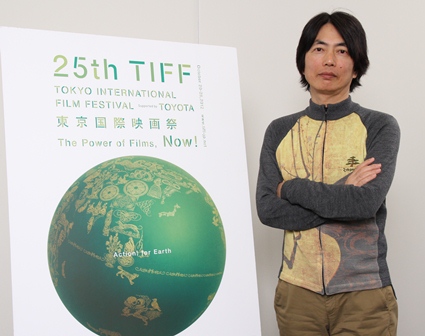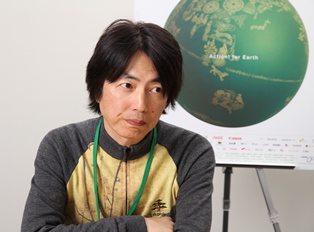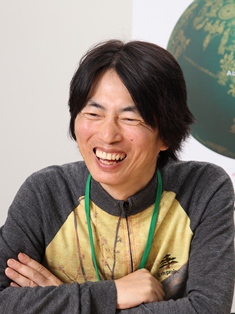Interview with Director Norio Enomoto (“Something Wicked Comes Over the Wall”)

The aftermath of the earthquake and tsunami has inspired a host of filmmakers. It certainly will for some time as Japan continues to deal with it. Norio Enomoto’s “Something Wicked Comes Over the Wall” takes on the subject with a novel approach. As the film breaks down genre conventions it comes to rest on an elegiac ending like something out of Ozu. We talked about inspirations, ideas and what the future holds for a generation of Japanese youth.
– I’d like to find out a little bit about you and your background. I understand you made a feature film, “A sky too far to see” a few years ago. I understand it had some festival showings. Could you tell me a little about this film?
Norio Enomoto: “A sky too far to see” was shot two years ago. I was 51 at that time. Before that I had been working in the same field, in film, but as an exhibitor – I was involved with distribution and production. But while I was working at all these companies as a salaryman, I was also writing scripts as well.
– I understand that you also teach scriptwriting.
Enomoto: Yes.
– And have you been doing that for a while?
Enomoto: About ten years.
– And have any of your scripts been produced and made by other directors?
Enomoto: Yes, for sure.
– One thing that very much interested me about this film is the screenplay, the script – mainly in that its trajectory is always surprising about where it’s going – in regard to what’s revealed and the different genre ideas that develop. Could you tell me a little bit about the writing of the script and what you’re ideas and theories are about scriptwriting?
Enomoto: In the course of studying scriptwriting, I discovered one thing that’s very important. There’s a huge gap between what’s happening in the film festival circuit and what’s happening in the actual cinema market. And I saw this gap become wider and wider – I think it started about the year 2000. You can see from about this time that many films are well received at film festivals, but they don’t necessarily do well, boxoffice-wise. They’re not lucrative. In making low-budget – as I do – art-house films, I would get them into film festivals, have them well received and have that buzz transfer over to the cinema market. But that’s stopped working from about the year 2000. I really stared to consider what to do about it and I came to the conclusion that If you don’t have the power of story – if you don’t create that – then it’s not going to work in this age. And it also doesn’t help just to do a well-done story. That’s not enough. Act one, setup; act two, conflict; act three, climax and end. If you have this kind of structure with a big budget and you do it in a flashy way – and then you have your stars – then it will succeed as a piece of entertainment. But no low-budget film will be able to compete with this kind of commercially successful film – if it’s done that style. Nowadays, if you’re going to do something like that you need a good story, but it has to be something innovative, something that you haven’t seen before, something that’s not conventional. So my way of dealing with that was to jump over genres. That creates a surprise and a great film-going experience. And you sort of get hooked. That I tried with my previous film “A sky too far to see.” That was in a way an experiment. It was received pretty well so I decided, OK, I’ll try this in a condensed shorter 35 minute film. It’s not that I just want to try a new tactic, but I want to bring forth a new worldview. So it’s not just a new tactic for a new tactic’s sake. That’s not my intent. I can use that new tactic to convey what I perceive of the world – for example as you can see in “Something Wicked…” – how it jumps over the boundaries of genres. You perceive a certain thing in one way, but then your thinking changes midway. And likewise, in Japan, the way people perceive the world is totally different before 3.11 and after 3.11. So that’s where that whole tactic fits in.

– You have a road movie turning into a horror movie – going up the dark road into the night – and you wake up the next morning to a different sort of movie. The essential story of 3.11, I think, that I get from your film, is that it is a longer horror movie, in that the tsunami that came over the wall – with the final pan of the ocean – is still out there and it can come over again.
Enomoto: Yes, as you say, in a general sense it is a horror film, but the story is there to depict changes in people. You can see it by the end of the film. The protagonist goes through a slight change.
– Leila?
Enomoto: Yes, Leila. You can see that it’s affected her slightly. So, it doesn’t end in just a simple horror story. There’s something else after that.
– What I meant was at the beginning you see the sea – a calm sea. And at the end you see the very same sea, but now it’s been informed by the tragedy, the story. You see the sea differently.
Enomoto: What I really like to depict is that nothing is completely happy and nothing is completely sad. There’s a certain sadness in happiness. There’s a certain happiness in sadness. I really like American films, American cinema, but when those film end, I would like to have the idea that they could have unhappy endings, but with a certain degree, or a certain drop of happiness. That’s the idea that I like. Talking about endings, there are bad endings and good endings, of course. There are films that intentionally make the ending a tragedy to match the reality. I don’t like that. But then, having a happy ending is not totally truthful. What I like to do is to depict an almost happy or an almost completely happy ending. Yayagachi – which means not completely, but almost there. So I want a “yayagachi” almost completely there, but not 100 percent.
– One of the images/ideas that you bring up is the idea of walls. It’s in the title. There’s the personal wall that Leila has dealing with her family’s problems in Tohoku – her denial of it. And then there’s the physical wall, the seawall that was supposed to keep people safe, but didn’t. Can you talk about the walls of Tohoku and your characters, of Japanese society?
Enomoto: Speaking of wall, the walls as we all know, there was a wall that we believed to be completely safe, that it would protect us. Nobody thought the waves would come over at that height. It tells us that something we’ve built that we believe to be absolutely safe is not necessarily so. And when something like that happens, human beings have no choice but to desensitize themselves in order to get through it. It’s their way of dealing with it. That, in this film, is the wall that Leila has built inside her emotions. She’s desensitized herself. But at the film you see, at a certain point, she says “It came over the walls.” I don’t think that’s such a bad thing for us as human beings.
– Let’s talk about your influences in filmmaking.
Enomoto: I grew up seeing more American films than European films. I particularly like films from the 70s. In this New Hollywood era, the boxoffice wasn’t all that great, but there were many good, solid films made. And the same thing happened in Japan too, but ten year earlier in the 1960s. The admission numbers began to drop. But the quality of the films was very good. That sort of similar situation held for the New Hollywood films of the 70s in America. In this era, American filmmakers were influenced by European filmmakers. And other kinds of films I like are American-influenced European films.
– For example?
Enomoto: Jean-Pierre Melville. And to give you an example of the 1970s New Hollywood influenced by European films would be Roman Polanski. Of course “Chinatown,” which seems like an American film but you can see the European influence. You can see it was made by a European director. But when it comes to Polanski, compared to other filmmaker highly praised in the film festival circuit, you can see that Polanski is a bit more influenced by the entertainment genre – especially after he embarked on his filmmaking career in the States. And take for example, Theo Angelopoulos. I like his films, but I’m not influenced by him.
– In regard to “Chinatown,” it has one of the more perfect scripts of any film.
Enomoto: Robert Towne! A famous script doctor said that “Chinatown” is the perfect script. The subtitles aren’t that good on the “Chinatown” DVD available in Japan.
– Plus I think there are some things that do not translate at all into Japanese. There are the famous lines about the “grass” and the “glass.”
Enomoto: Yes!

– Do you see some of those things, the American cinema of the 70s, Jean-Pierre Melville coming through in your own films?
Enomoto: I think so. I hope so.
– Your film talks about the effects of the earthquake and tsunami through these characters who are young people going up north, going through changes themselves. How do you feel about a young generation of people where the tsunami may be the major thing that has happened in Japan during their lives? Do you think it’s going to change a mentality for a whole generation of Japanese?
Enomoto: A lot of people say that it won’t change anything. This voice is especially strong among the younger generation. The way I see it is that, maybe it’s that the younger generation tries to somehow get accustomed to this devastation. Not desensitized, but try to handle it in their own way – like getting used to that sense of devastation. But to that I say no! That’s not the way to go about it. Don’t be complacent or say OK to that. The problem with this devastation is it’s not a tragic or shocking devastation. It’s the kind of devastation that sort of seeps in slowly. If it’s a tragedy that slowly seeps in, there’s a way to adjust to that, to adjust your tuning. People are able to handle that and therefore take it as it is. But that holds no hope for the future. And what I wanted to say in my previous film is that unless young people come up with a solid tactic to say no to that devastation, then you have no choice but to pick up what’s around you – to pick up the tiny happinesses. And say, OK, I can survive with this. I’m happy with this. But that sense that there is no choice but to go about it that way, I say no to that. That’s the message I want to convey.
Interview by Nicholas Vroman



















